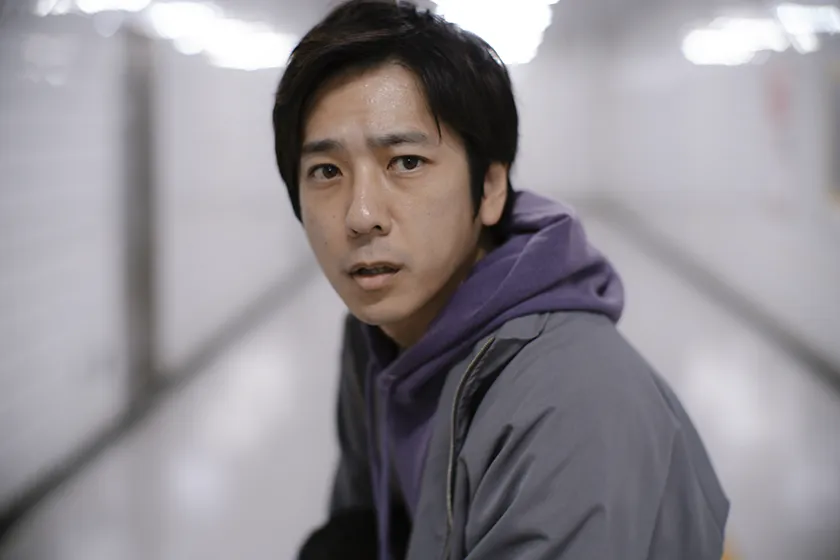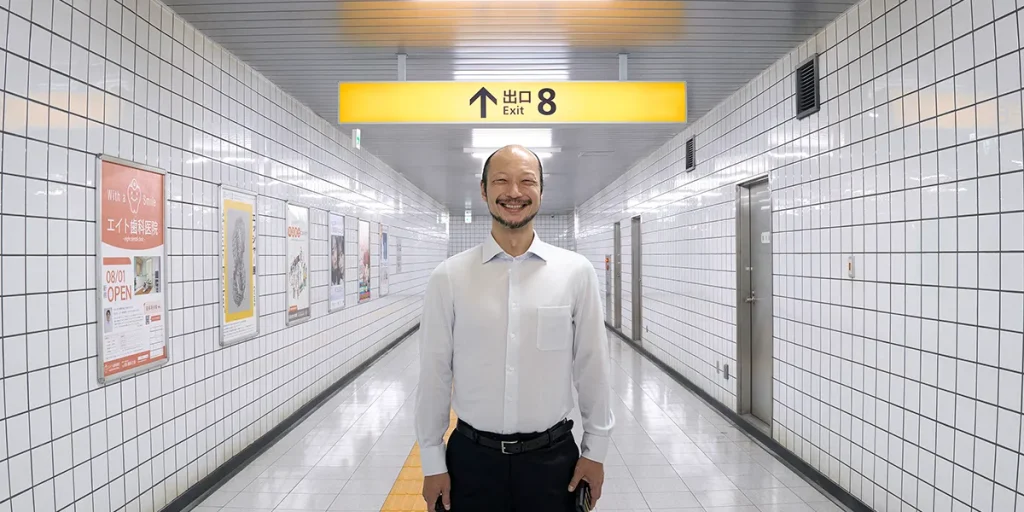Kazunari Ninomiya shines in the haunting and gripping Exit 8, where Genki Kawamura teaches us that to be human is to make choices.
Director: Genki Kawamura
Genre: Psychological Horror, Adventure, Mystery, Thriller
Run Time: 95′
BFI London Film Festival Screening: October 8-9, 2025
U.S. Release: April 10, 2026
Exit 8 (8番出口 – Hachiban Deguchi) starts with one of the best opening scenes I’ve seen this year. A young man is on the underground, in Tokyo, doomscrolling on his phone while listening to Maurice Ravel’s “Boléro (M. 81)”. Soon, another noise joins the rhythmic sound of the snare drum in the background; the man removes his earphones and turns around. It comes from a baby, crying in his mother’s arms.
Suddenly, a businessman starts shouting at the infant. “Shut up!,” he says, towering over mother and child. “We’re all pissed off!,” he adds, but no one says a thing. Our protagonist puts his earphones back on and turns around, ignoring a phone call. With the music playing again, he marches out.
Director and producer Genki Kawamura (producer of gems like Monster, Your Name., and Weathering with You) – who also co-wrote the movie with Kotake Create and Hirase Kentaro – and the film’s creative team open Exit 8 with a long take that, in a few minutes, showcases what can be accomplished with the medium. Image, music, and sound flawlessly interact to grab our attention from the minute the film begins, making us laugh at the absurdity of a situation whose dynamics we recognize. Naturally, we’re curious to find out where our hero is headed; but we’re also given a subtle introduction to the film’s themes.
It’s no coincidence that “Boléro” is the orchestral piece that opens our tale either. Even Ravel himself describes his composition as having “no music in it”, as it consists of obsessive repetitions of the same rhythm with no thematic progression throughout. Similarly, our helpless young man will soon start literally running in circles while trying to find the titular exit. But the scene we’ve just witnessed is there for a reason, too, in a story that ultimately teaches us that to be human is to make choices, even when we can’t predict the outcome.
Exit 8 is adapted from a 2023 adventure game created by Kotake Create (Kotakenotokeke), a walking simulator set in the Tokyo subway. The player starts at Exit 0 and has to walk the same circular metro corridor eight times, trying to spot the differences in the layout. Kawamura’s film has a similar premise, but the director also imbues the movie with an intriguing, haunting story that not only feels coherent to the game, but also has something to say.
It all starts when our protagonist – known only as “Lost Man” (Kazunari Ninomiya) – exits the train. His phone rings again, and this time, he picks up; it’s his partner (Nana Komatsu). “I’m in the hospital,” she says. “I’m pregnant.” Our hero is in shock, and doesn’t know how to answer. Is he ready to be a father? He feels an asthma attack coming on and looks for his inhaler. Soon, the phone’s signal is gone and the connection is lost. But there is a sign to “Exit 8” in front of him.
It doesn’t take Lost Man long to realize it’s not going to be easy to exit the subway. Somehow, our hero is stuck in a loop, with no real exit in sight, forced to repeat the same motions over and over again. He’s not alone; a businessman walks by him each time he reaches the corridor with the posters. “Walking Man” (Yamato Kōchi) doesn’t say much, and we’ll soon find out why, but that’s another story. Eventually, Lost Man notices a set of instructions. “If you find an anomaly, turn back immediately. If you do not find any anomalies, do not turn back. Go out from Exit 8.” They sound simple enough, except they aren’t.
Exit 8 is set almost entirely in this never-ending corridor, which soon becomes so familiar that we’re able to remember exactly what we’re about to see. Yet, the film is never boring. As Lost Man realizes that he has to look for clues, so do we. We want him to succeed and we even start playing along; sometimes we find the answers before he does, and that’s exactly what Kawamura wants. In a movie that plays out completely in real time, almost like a video game, Kawamura carefully selects what to show us, to heighten the stakes and make us more engaged. And as Lost Man moves up more levels, the disturbing elements increase, in a psychological horror that isn’t scary as much as it is disquieting and increasingly graphic. Soon, other characters come into play, and the puzzle becomes even more intriguing.
At first, watching Exit 8 feels exactly like navigating the Tokyo metro, whose passageways all look the same and whose exits are often incredibly hard to find. But as Lost Man delves further into the game and the horror elements start to emerge, it becomes a completely different beast, one that will creep you out, but that will also entertain you, especially if you’re watching it with a crowd. With a well-written screenplay that knows exactly when to change tone, fantastic editing (Sakura Seya) and cinematography (Keisuke Imamura) that combine a dejà-vu feeling with new, unexpected elements, and a flawless score (Shohei Amimori) that often consists of low notes and eerie, distorted sounds, Exit 8 will have you gripping your seats just as often as it will have you laughing out loud in delight.

Thematically speaking, the film is at its best when it manages to show us, not tell us, its central message, which, unfortunately, is not always the case. Though the story is always gripping, Exit 8 has the tendency to keep repeating one of its central themes to us over and over again, even if most viewers will have gotten that exact message by simply watching the opening scene. Is Lost Man ready to become a father? If he wasn’t even able to speak up for the poor woman on the train, how can he be a role model for his own child? At one point, the movie sees Lost Man actually utter these words, and as if that wasn’t enough, he soon finds himself first looking back at himself on the train, and then interacting with his possible future son in a flash-forward.
Thankfully, Kazunari Ninomiya, as Lost Man, is the glue that holds Exit 8 together, as if we can overlook the film’s flaws, it’s in no small part thanks to his superb performance. With fantastic comedic timing and an impressive ability to make us emotional, Ninomiya imbues Lost Man with such innocence, determination, and humanity that we’re right there with him at all times, unable to take our eyes off him and unaware of the passing time. Yamato Kōchi, Nana Komatsu and Kotone Hanase play characters whose exact roles are best left unspoiled; all three excel, each responsible for one of the film’s most unexpectedly disquieting scenes. But the other standout of the movie is Naru Asanuma, who plays “The Boy” in a first on-screen performance that’s bound to earn him many more roles in the future.
What exactly is an “anomaly”? How can we distinguish it from a real human being? And what if anomalies are simply humans who lost the game? In an accurate parallel to the Japanese society, the only way to survive “Exit 8” would seem to be conforming to a world that wants us all to look and behave in the same, self-centered way, caring only about our own existence and letting everyone else fend for themselves. But maybe the mechanism can be broken, and maybe we aren’t giving children enough credit. Maybe, if we start actually listen to them, we can reclaim our innocence and wonder, and finally find hope. But how do we make a choice when we have no way of knowing if it’s the right one? Exit 8 teaches us that, sometimes, you just have to take a leap, and trust you’ll be alright.
Exit 8: Movie Plot & Recap
Synopsis:
A man finds himself trapped in a subway station in Tokyo, and the only way to come out of the loop is to complete a series of challenges, and overcome his own fears.
Pros:
- A surprisingly engaging and thrilling story despite it taking place mostly in one location
- Fantastic acting from the whole cast, especially Kazunari Ninomiya and Naru Asanuma
- Superb technical execution that makes the film both funny and tense, with eerie horror elements that will haunt you for days to come
- Interesting parallels to the Japanese society
- An intriguing message about our role in society, the importance of empathy, and how we need to trust and listen to our children
- An adaptation that stays true to the spirit of the game while also introducing new elements
Cons:
- The film keeps repeating one of its narrative threads – about the protagonist not knowing if he’s ready to be a father – over and over again in a very didascalic and unnecessary way
Exit 8 was screened at the BFI London Film Festival on 8-9 October, 2025. The film will be released in U.S. theaters by Neon on April 10, 2026.

